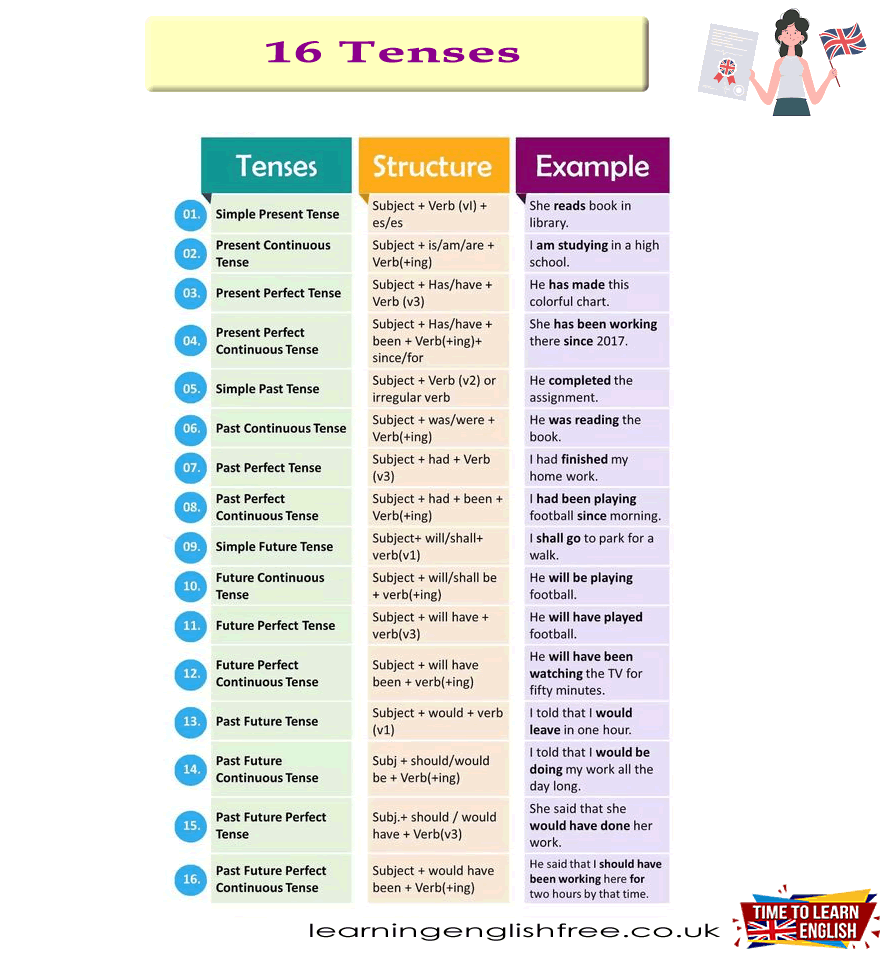
Introduction to English Tenses
Welcome to our comprehensive lesson on the 16 Tenses in English. In this lesson, you'll learn about each tense, its structure, and how to use it in sentences. By the end of this lesson, you'll have a clear understanding of how different tenses are formed and applied in everyday communication. This knowledge is crucial for expressing time-related actions and events accurately in English.
Learning Objectives
- Understand the structure of each of the 16 English tenses.
- Learn how to form sentences using different tenses.
- Recognize the context in which each tense is used.
Part 1: Understanding Tenses 1-8
-
Simple Present Tense
- Structure: Subject + Verb (V1) + s/es
- Example: She reads a book in the library.
-
Present Continuous Tense
- Structure: Subject + is/am/are + Verb(+ing)
- Example: I am studying in a high school.
-
Present Perfect Tense
- Structure: Subject + Has/have + Verb (V3)
- Example: He has made this colourful chart.
-
Present Perfect Continuous Tense
- Structure: Subject + Has/have + been + Verb(+ing) + since/for
- Example: She has been working there since 2017.
-
Simple Past Tense
- Structure: Subject + Verb (V2) or irregular verb
- Example: He completed the assignment.
-
Past Continuous Tense
- Structure: Subject + was/were + Verb(+ing)
- Example: He was reading the book.
-
Past Perfect Tense
- Structure: Subject + had + Verb (V3)
- Example: I had finished my homework.
-
Past Perfect Continuous Tense
- Structure: Subject + had + been + Verb(+ing)
- Example: I had been playing football since morning.
Part 2: Exploring Tenses 9-16
-
Simple Future Tense
- Structure: Subject + will/shall + Verb (V1)
- Example: I shall go to the park for a walk.
-
Future Continuous Tense
- Structure: Subject + will/shall be + Verb(+ing)
- Example: He will be playing football.
-
Future Perfect Tense
- Structure: Subject + will have + Verb (V3)
- Example: He will have played football.
-
Future Perfect Continuous Tense
- Structure: Subject + will have been + Verb(+ing)
- Example: He will have been watching TV for fifty minutes.
-
Past Future Tense
- Structure: Subject + would + Verb (V1)
- Example: I told that I would leave in one hour.
-
Past Future Continuous Tense
- Structure: Subject + would be + Verb(+ing)
- Example: I told that I would be doing my work all day long.
-
Past Future Perfect Tense
- Structure: Subject + would have + Verb (V3)
- Example: She said that she would have done her work.
-
Past Future Perfect Continuous Tense
- Structure: Subject + would have been + Verb(+ing)
- Example: He said that I should have been working here for two hours by that time.
Summary and Takeaways
In this lesson, we explored the 16 tenses used in English. From the Simple Present to the Past Future Perfect Continuous, each tense has its unique structure and application. Remembering these tenses can be made easier by creating visual aids like mind maps or flashcards. Practising these in daily conversations will also help in reinforcing your understanding. Don't forget to visit our Facebook page at www.facebook.com/learningenglishfree.co.uk for more interactive lessons and tips. Sharing this knowledge with friends and family can be a fun way to learn together.
